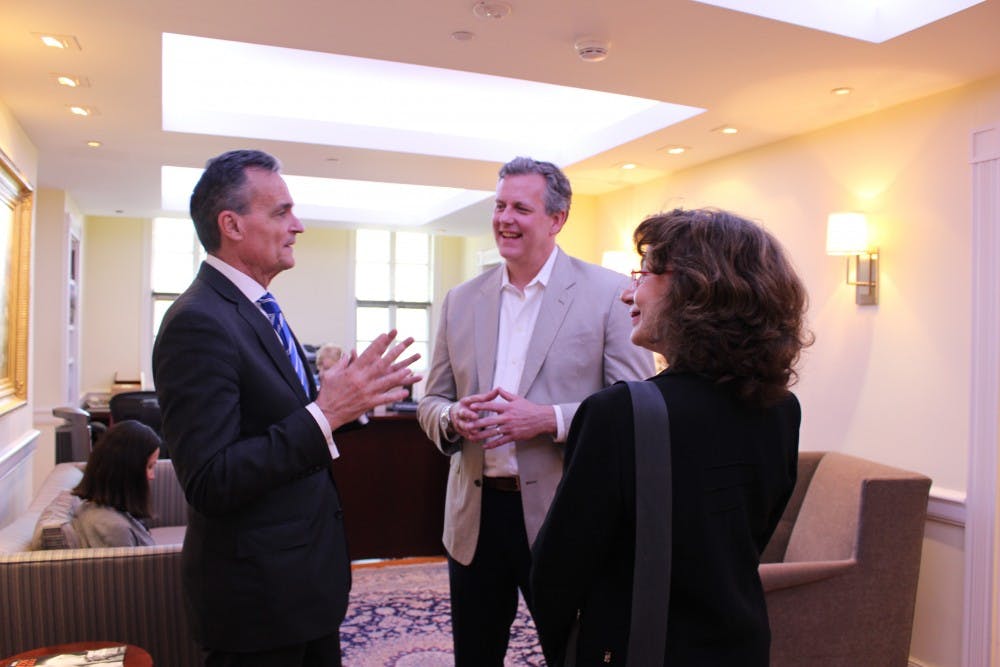Many ambassadors are known for their polished and discreet “diplomatic language.” According to Gérard Araud, however, blunt communication has been just as effective for the job of of the French Ambassador.
Approximately 100 students and faculty members gathered today to hear French Ambassador to the United States Gérard Araud discuss the future of French foreign policy.
Suleiman, professor of international studies and director of the Program in European Politics and Society, introduced the ambassador as “not your run of the mill” diplomat, referring to Araud’s extremely direct mode of communication. Araud’s straightforward way of working deviates from a diplomat’s standard tendencies to use more discreet “diplomatic language,” he said.
Araud’s no-nonsense personality stood out immediately as he walked behind the podium and promptly began his speech, stating his intention was to talk about the French National Elections and Syria before responding to questions from the audience.
When asked about French politics in the past, Araud said he normally began by explaining the differences between the French and American political systems. Today, however, he found himself in a new predicament.
“Our political lives are totally comparable,” he said.
Araud began by stating that many countries in the sphere of Western democracy are experiencing the “same rebellion of some of our citizens.” This “rebellion” refers to the rise of populism across the borders of Western democratic countries. This major shift in politics has manifested itself through Brexit, the election of Trump, and now the popularity of French extreme right-wing politician Marine Le Pen.
“A lot of the French, like a lot of Americans, think that the elites have not delivered,” he said.

According to Araud, many French citizens want to “toss the table” at “nearly any price” because they are dissatisfied with the performance of traditional political parties and feel as if they have been neglected by the political elite.
He added that 85 percent of voters in support of Marine Le Pen “will vote for her no matter what.” Araud voiced the concern that this extremely dedicated group of voters has the ability to take control of the election.
“Will the majority mobilize against this determined minority?” Araud said that this is the pressing question in France’s current election cycle. The answer to the same question in America and Great Britain has been “no.”
When asked about the consequences of a possible Marine Le Pen presidency, Araud first reminded a few concerned audience members that the transition from one administration to another takes time.

“Just like with any new president, we would have to wait and see how the real policies, as opposed to campaign rhetoric, will play out,” Araud said.
However, Araud sounded much less optimistic about the future of the economy if Le Pen wins the election. Le Pen is running on the promise of getting France out of the Eurozone and the European Union. In previous interviews, Le Pen has described the EU as an institution “poking a knife in your ribs.”
Araud explained that “going out of the EU means devaluation” and further described the consequences as a “world financial crisis.”
He touched upon the major upheaval it would take to simply deal with logistical issues of changing from the Euro to the Franc. Banks would have to close and as during Greece’s financial crisis, a financial standstill would occur. More significantly, the consensus, even held by Marine Le Pen’s National Front, is that the Eurozone cannot exist without France’s participation. Thus, according to Araud, it is possible that France’s exit and the following destruction of the Eurozone could mean the end of the European Union.
While discussing the effects the rise of Western populism will have on foreign policy and the current unstable situation in Syria, Araud stressed that, as a diplomat, he does not live in a “world of wishes” but in a “world of facts” in which he must simply “see what we can do.”
Assad highlighted his realistic take on alleviating tensions in the Middle East, stating that his job as a diplomat is to “handle the world as imperfect it is” and to “try to modify it at a margin.”
The event was held on April 12 at 4:30 p.m. in Robertson Hall. It was sponsored by the European Union Program, an organization that promotes interests in issues relating to the European Union and European politics more broadly.
Staff writer Katie Peterson contributed reporting.








